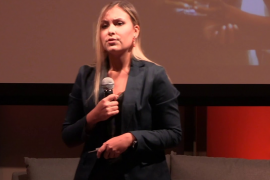Across the globe there are young and resilient personalities in the STEM fields who have been adding values to the STEM industry and impacting on the lives of other people through research, innovations and special initiatives.
In the Middle East, we have Aya Mouallem a young Lebanese university undergraduate who is working to make the world a better place. Aya is the co-founder of All Girls Code, a nonprofit initiative that is helping young women in the Middle East find a footing in STEM.
During the Devex World 2018 in Washington, D.C., Aya shares her story on how her journey in STEM began and how far she had gone in helping fellow women in the Middle East. An excerpt from Johnson & Johnson.
“I was always a curious kid. I asked way too many questions about how everything works—so much so that my teachers and parents frequently had to look up the answers just to satisfy me. And I was always tinkering with things.
In Arab communities, including in my home country of Lebanon, girls unfortunately are not encouraged to do these things—they are only expected to play with dolls. Thankfully, my parents encouraged my tinkering skills.
At a young age, I was fixing PCs and smartphones, and began to learn coding on my own. In high school, a friend and I taught ourselves Python—a type of computer programming language—and used it to create a program that designed spiral staircases. The project ended up winning all the science fairs we participated in.
Naturally, I decided to pursue computer engineering when I enrolled in the American University of Beirut in 2016. In my first software engineering class, I was one of two girls in a lab with more than 20 students. As I moved up in my degree, the overall number of girls decreased even more. I never felt disrespected or underestimated because of that gender disparity, but I was troubled by it.
One day, when a female friend of mine did not do well on an exam, she laughed and said, ‘Aya, I shouldn’t worry about my grade. I can always get married, have kids and stay at home!’
I was shocked because I was not raised that way. But soon, I heard this opinion echoed by several other young women at school. I also came to know women who transferred out of computer engineering because they were disheartened by how few females they saw in the field. That is when I realized just how much a role society plays in why girls tend to avoid the engineering field, or join it only to leave before they have made their mark—and it frustrated me.
I reached my breaking point when an older family friend questioned my choice of major by saying that ‘females cannot do that type of complex math.’ That comment struck me as wrong on so many levels. But, I thought: If I cannot correct the archaic mentalities of many of the older generation, I can at least help the next.
That is when I decided that I would work to get young girls interested in STEM and help them feel confident in their abilities, so if they decided to pursue STEM fields, they would not feel pressured to drop out because of societal expectations and stereotypes.
I talked to my classmate Maya Moussa about my plans to start an initiative around these ideas, and together in March 2017, we founded All Girls Code, which provides free, hands-on coding experience and technology workshops to girls up to the age of 18 in Lebanon.
The Impact of All Girls Code—All the Way to Google
We have been around for a year now, and in that time, 100 girls have been introduced to STEM in an empowering environment, taken crash courses in leadership training, participated in a hackathon, built websites and apps, and learned and applied university-level algorithms. I am very proud to say that 90% of the girls who have attended All Girls Code programs—and applied to universities—have chosen to pursue STEM fields.
I am also proud that all of our work so far has been done by volunteers on zero budget. At times, between other university students and the parents of participants, we have had as many as 100 people helping us out. We host our events at the university Maya and I attend, so we do not pay to reserve a place. The computer science and engineering departments at our school have also been very helpful and supportive, installing any additional software we may need.
All of this resourcefulness has paid off.
We were honored by Lebanese Prime Minister Saad Hariri when he announced All Girls Code as a partner in his Summer of Innovation Program, which celebrated activities in the areas of innovation, entrepreneurship and creativity.
Maya and I were chosen as Women Techmakers by Google because of our work to encourage females to pursue tech fields, and I was announced as a Stanford she++ Ambassador, and consequently attended the she++ Gala in Silicon Valley, which celebrates diversity in technology.
I mention all of this because I want to set an example for all girls. I want them to know that they can change the world if they set their minds to it.
In the next year, Maya and I plan to collaborate with tech companies to further expand All Girls Code. We have funding from Stanford she++, which we will use to buy parts for hands-on robotics workshops. We plan to carry on with our work for free so that everyone can participate, including refugees, who we welcomed at our last event.
We are also currently working on developing a board for the initiative, since Maya and I will be spending more time abroad soon, and we want to be sure that those who take over the day-to-day running of the program will be ready for the challenge.
There is always a space for a go-getter, Aya’s story has inspired and push many young girls into pursuing their dreams.




